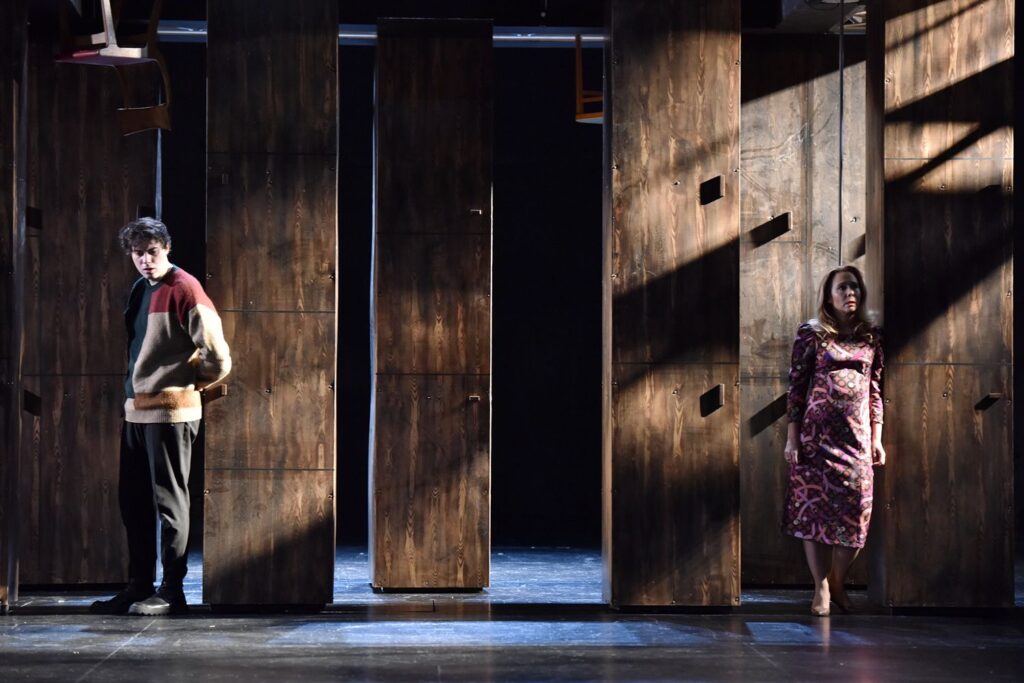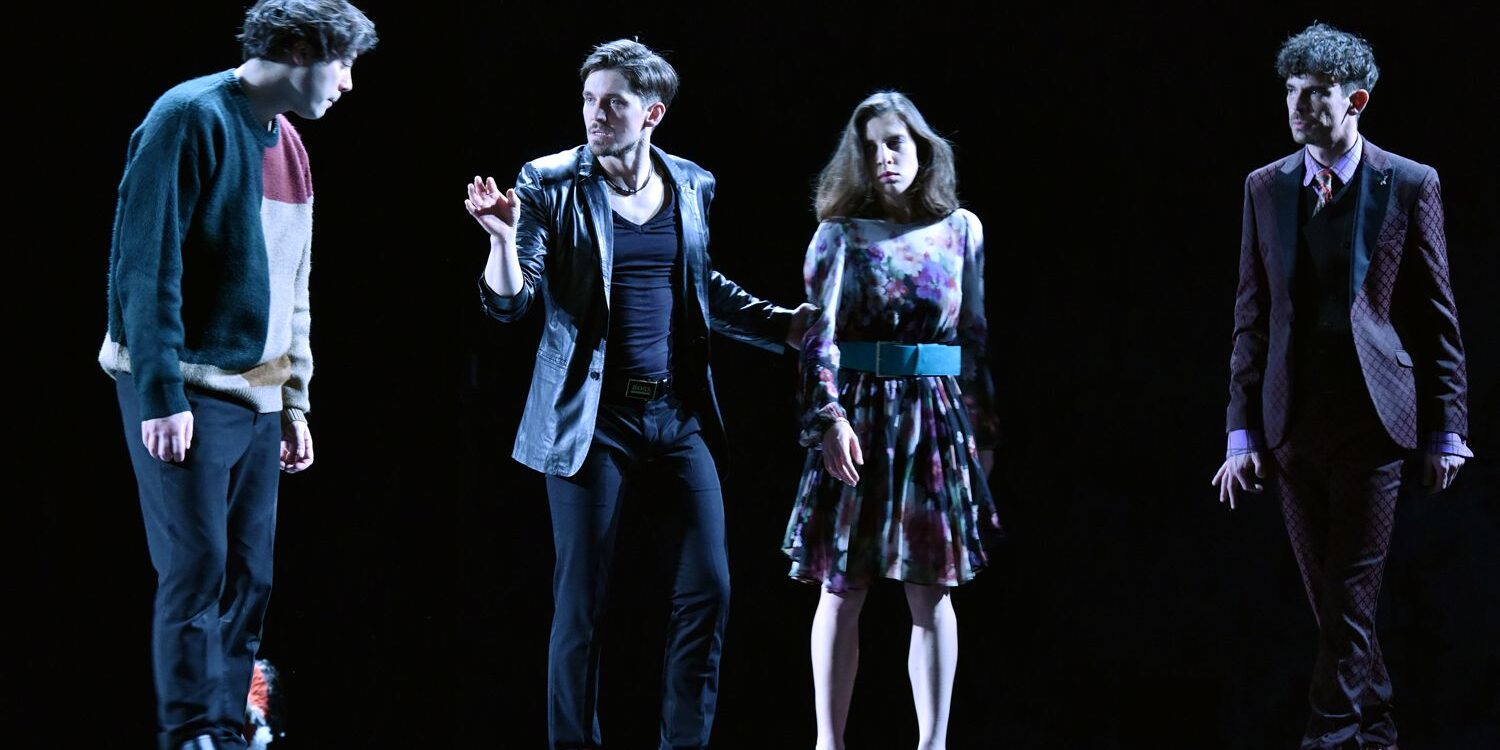SNG Drama Ljubljana, premiere 16th February 2022
It’s a phrase that we all keep repeating, even though no one has believed in it for a long time, if anyone ever did: “Everything OK.”
An art student comes on stage with a portfolio under her arm and persistently claims that “everything OK” on the phone. She announces a performance that will deal with everything that is not OK, a performance about everything that a person keeps quiet about every day.
Simona Hamer’s play, which premiered in February, explores the moments in life when we convince ourselves that everything is ok, instead of loudly shouting that some things – your hyperactive boss, “casual racism,” groping without permission – are definitely not ok. The realistic text is written in fresh, modern language, which is contrasted with a movement-rich production by the director Matjaž Farič, who is also a choreographer and dancer.
The play takes place in an apartment block, with an escape room on the top floor, where an extremely ‘cool’ executive director has brought a group of not-so-energetic co-workers for a team-building exercise.
On the stairs of the flat, we meet a resident, an immigrant from the Republic of the former Yugoslavia, who earns money with housework, and a lonely widower. The young Mihaela – who we first saw with a portfolio and a phone in her hands – turns out to be a game-master (as student job) in the escape room. Mihaela presents to the teambuilding group the story of the ‘Timekeeper’, who invented a way to stop time. Because many wanted to take possession of this invention, he was forced to take a dangerous journey from home with his family. Through the riddles left by the Timekeeper in his workshop, the group has to find the key to eternity.
The drama explores the state of being a refugee and how it affects innocent people through a poetic narrative. But the staging, with the Timekeeper, played by the actor Saša Tabaković, appearing only in a black-and-white projection on the back wall, means this idea remains hermetic; it fades into the background, or, at times, even stops the flow of the performance.
The staging is based around the exchange of scenes in the escape room and from the staircase. Gregor (Klemen Janežič), the executive director of a successful start-up company, encourages his colleagues with clichés: “fake it till you make it” “c’mon people”, “creative juices flowing.” He becomes a tragic-comic caricature of capitalism.
The concept of constant productivity is transferred to the stage in the form of the constant physical movement of the performers. The actors in the escape room – on the empty stage, where we are just imagining the room – steadily step up and down as they speak their lines.
Despite their formalized movement, which begins to appear somewhat rigid and does not involve any actual depiction of solving riddles, the actors interpret the text in a expressively rich and diverse way. There is almost no direct dialogue between them. With an audience-oriented delivery, the characters either comment on others or address their inner hardships, fears, desires. Aljaž (Benjamin Krnetić), the failed artist resolves his relationship with wife and family, Leon (Nejc Cijan Garlatti) would rather be with his lover, Tanja, who, with her biting remarks, is played with nuance by Barbara Cerar. The freshly employed secretary Rebecca, seen by others as just a pair of legs in a too-short a skirt, is played by Tina Resman, who manages to skilfully match naivety and smiles with a physical anxiety that erodes her from within.
By creating contrast between the internal and external image of the individual, the performers successfully expose the empty relationships and games that workers within the system of capitalism are forced into. These contradictions in a closed room result in all their hidden feelings coming to light, triggering a fight, vomiting, and a slap.
Unlike the Timekeeper’s poetic monologues and the scenes of indirect communication in the escape room, on the scenes which take place on the staircase, we follow the dramatic dialogue between the self-confident and witty Lili (Maša Derganc), who is cleaning the staircase, and the elderly Franci (Valter Dragan), who constantly follows her. If he seems a bit sympathetically old-fashioned at the start, through the perseverance of his narrow-minded statements and disregard for Lili’s personal space, the viewer becomes increasingly distant from him and recognizes the toxicity of his seemingly harmless words. Dragan, with his one-layered and still acting style, demonstrates how ‘everyday racism’ operates. In his world, there is no room for any difference or otherness; Mihaela’s green hair, his daughter’s black partner, the educational system ‘down there’ in Lili’s homeland.

Everything OK at SNG Drama Ljubljana. Photo: Peter Uhan
The play approaches the patterns of patriarchy in a fast-paced capitalist system in an unobtrusive and, at times, witty way by closely observing the interpersonal relationships of the characters without condemning them. However, it takes a clear position against the Franci(s) and Gregor(s) of our world, against objectification and the insensitive condemnation of everyone and everything. But this comes to be a problem. The performance addresses so many issues, that it just touches on them and nothing more. This is even true of the alleged sexual abuse, Aljaž gropes Rebecca at the moment of the power outage, but this remains unclear and out of context.
And if the performance is successful in capturing the current zeitgeist, skipping between scenes in different spaces, it also seems stagnant at times. Despite the quality of the acting, especially in the escape room scenes, the performance as whole begins to drag begins to drag and lose its sharpness. In the end, when the whole team-building exercise has turned into chaos, despite finding the exit, there is no salvation, only a return to the wheels of everyday life for the characters and, it seems, for the spectators as well. Unless, if like Mihaela at the end, you gather the courage to finally submit your portfolio for your entrance exams and try to do what you want to do.
Credits:
Author: Simona Hamer
Dramaturg: Staša Prah
Costume: Alan Hranitelj
Composer: Damir Urban
Choreographer:Matjaž Farič
Lighting: Borut Bučinel
For tickets and further information, visit drama.si
Further reading: review of The Party, by Sally Potter, at SNG Drama Ljubljana
Iva Š. Slosar is a student of dramaturgy and performing arts. She writes theatre criticism for web portals and participates in the cultural department of Radio Študent (Slovenia). She is also engaged in drama writing and theatrical creation as a practical dramaturg.








